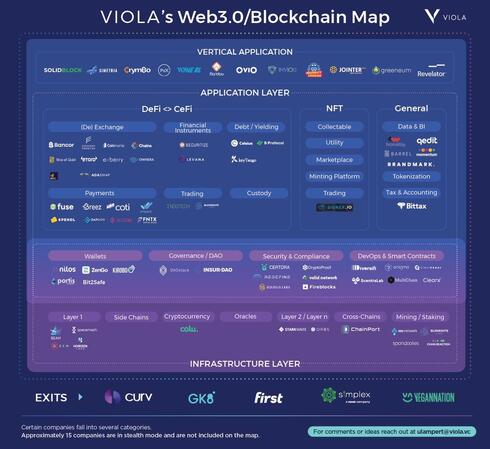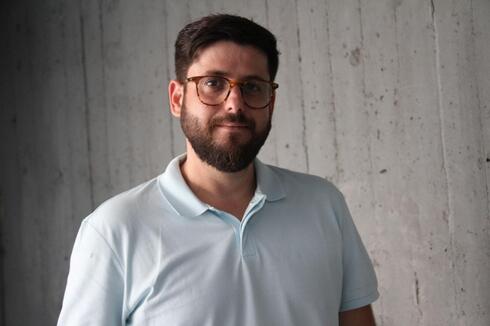

Taking stock of Israel’s blockchain and crypto landscape in 2022
Despite some notable success stories, Israel’s tech sector has been slow in embracing the Web3 movement. But is it too late for blockchain and crypto to follow in the footsteps of cybersecurity to become a lucrative source of export and pride for the country?
On the face of it, Israel seems like the ideal hotbed for blockchain and cryptocurrency innovation. All of the aspects that led the country to be nicknamed Startup Nation, resulting in disruptive innovation across various industries, should have in theory also seen Israel become a global leader in the blockchain, bitcoin, and crypto space, which over the past couple of years has been elegantly renamed by many as Web3. There are of course significant success stories to point to of the likes of unicorns Fireblocks and Starkware, as well as exits of startups, namely Unbound Security’s acquisition by exchange giant Coinbase for over $150 million and that of Curv by PayPal for a sum estimated at $200 million. Not to mention Israel’s position as home to some of the world’s top cryptographers. Nevertheless, there is almost a consensus on the fact that Israel’s tech sector has been slow in embracing the Web3 movement despite its global growth and incredible potential.
But have Israel’s tech talents already missed their opportunity to board this rollercoaster? Are the scars of the scam-ridden 2018 ICO bubble too deep to overcome? Will the local petrified regulators ever do their part in promoting innovation in this space? These are just a few of the questions that need to be answered to determine whether Web3 can follow in the footsteps of cybersecurity, and more recently fintech, to become a lucrative source of export and pride for the country.
“The number of players is still very, very small in Israel, but they are companies of very high quality. I think the number will also grow in the next two years because Israelis are very pragmatic and they see the economic opportunity and the perception of the industry has radically changed,” explained Ouriel Ohayon, CEO and co-founder of Israeli startup ZenGo. The company develops a crypto mobile wallet for retail investors and raised a $20 million Series A round led by Insight Partners last year. “I think we have already passed the phase of awareness and the acceptance that it's an inevitable evolution and maybe a revolution. So I think everyone understands that, from banks to financial institutions to regulators to government. We were in a phase of ‘this is a dark industry made for criminals’ and now we are in the acceptance phase where people quickly understand that this is an inevitability. The next phase is ‘how can we embrace it?’ For that to happen there needs to be a coordinated regulatory effort that protects investors, but does not hamper innovation.”
While it depends on how you characterize a Web3 company, there is little doubt that there are currently around 100 Israeli companies at different stages of maturity with significant activity in the sector. This includes companies at the infrastructure layer level, like Orbs for example, which provides public blockchain infrastructure for companies, or SCRT Labs, which built the Secret Network that recently made headlines after being used to launch a collection of NFTs issued by Quentin Tarantino of chapters from the original handwritten Pulp Fiction screenplay. There are numerous companies active in the application layer that include DeFi (decentralized finance) and CeFi (centralized finance), including names like 2Key Network, which integrates smart contracts into HTML links, and ClearX, which builds blockchain-based settlement and clearing networks. There are also numerous other layers, that among others include Israeli-founded Unicorn Celsius, which develops an earning and lending platform and raised $400 million at a $3 billion valuation last year, and Simplex, which provides fiat infrastructure for the cryptocurrency ecosystem and was acquired last year by Canadian payment processing giant Nuvei for over $200 million.
“I feel we are at a point of building critical mass that will make this wave of innovation in Web3 be the one that stays with us even across cycles,” noted Omry Ben-David, General Partner at Israeli venture capital firm Viola Ventures, which recently produced a Web3/Blockchain map of Israeli companies in the sector. “I believe that the five forces of adoption: the institutional asset managers, the consumers, the brands, the regulators, and the investors, are all coming together to reach a point of no return. The world is going towards leveraging the advantages that blockchain has to offer.”
Avishay Ovadia, Founding Partner at Collider Ventures, an Israeli venture capital fund focused on digital assets and the digital economy with over $200 million in assets under management, echoed a similar sentiment. “There aren’t a lot of companies in Israel but it feels like that is about to change,” he said. “Soldiers coming out of Units 81 and 8200 are looking around where they can actually disrupt. They don't want to build another mini solution for some AWS specific server. They want to solve a very big problem, like cyber solutions and MPC (multi-party computation). With the fintech industry in Israel also booming, you can see more entrepreneurs who are basically trying to create Web3 components or protocols based on the knowledge that they have from the fintech industry, which is basically now called DeFi. And there is also the whole NFT gaming industry where again, Israel has a lot of experience in that field.”
Maya Zehavi, Founder and CEO at Stealthy new venture, which invests mainly in Web3 projects abroad, isn’t as optimistic as Ovadia, believing Israel is still a couple of years away from making a big splash in the sector. She noted custody as a sub-sector in which Israeli startups could excel, noting the likes of Fireblocks and Curv, as examples. “This isn’t surprising because it goes into two things that we are really good at: cryptography and cyber. But you also see some solutions that came out of Israel that totally missed where the market was and they were bought very, very cheaply. There are a lot of people coming in, but they don't necessarily have experience. They don't necessarily understand this sector,” Zehavi explained. “It took two-and-a-half years for the tech backlash to make it from San Francisco to Israel and it took three-and-a-half years for cancel culture to be an issue of public discourse. So I'm guessing that even with all the money and hype involved, the potential of Web3 and crypto are probably only going to be much more ingrained within the industry within a year-and-a-half to two years. It will be then that the myriad of new ideas that will be built on Web3 will be a lot more appealing.”
One of the main companies highlighted by Zehavi as a true innovator was StarkWare. The Israeli startup, which aims to solve the problems of scalability and privacy hampering blockchain technology, secured $50 million in a funding round led by Sequoia Capital in November of last year, valuing the company at $2 billion. Calcalist reported. StarkWare has instituted a new highly-efficient method for blockchain-based computation, which is used by some of the leading platforms and applications around the world. The company was founded in 2017 by Uri Kolodny (CEO), Eli Ben-Sasson (President), Michael Riabzev (Chief Architect), and Alessandro Chiesa (Chief Scientist). Ben-Sasson was intrigued by the bitcoin and blockchain space early on, ultimately leading him to the founding of StarkWare.
“I guess like everyone else I arrived by chance,” he said. “At the time I was doing mathematics and theoretical computer science related to validity proofs and zero-knowledge proofs and I was also interested in making such proofs more efficient and even programming them in practice. The turning point for me was at the Bitcoin conference in San Jose in May 2013 where I realized that all of this theoretical research in math was highly needed in the world of blockchain. So that's where I swallowed my red pill.”
Ben-Sasson was also involved in the founding of privacy-protecting crypto Zcash and the breakthroughs in research achieved with his colleagues led to post-quantum secure and more future proof technology that they named ZK Stark.
“I'm very happy and proud to say that Israel and Israelis were very influential and important in the very early days of blockchain and they still are. Even in 2013, Israel and Israelis were very important and influential in the young blockchain space. We are the Startup Nation for a reason. And this is still the case,” said Ben-Sasson. “It is a relatively good time for companies, small and large, to raise funds. This is true in all sectors, but also in the blockchain space, and a lot of excellent companies, those you haven't heard of yet and existing ones, are raising funds, hiring, and doing excellent work. I am very, very bullish and optimistic about the whole blockchain space and about Israel's ability to be a leader in that sector as well.”
One issue Ben-Sasson is far from optimistic about though is regulation in Israel. “The regulatory understanding of what blockchains are is only very early in all countries and Israel is not lagging behind in that aspect. But I am sad to say that there's one area in which Israel is really lagging behind other countries and that is in the area of banking, the exclusion of blockchain companies and individuals. It's relatively hard for Israelis, honest Israelis, who have been involved in mining and things like that to bring proceeds from their involvement in cryptocurrencies into the Israeli banking system. And in this one aspect, I think things are much worse than in most of the OECD,” explained Ben-Sasson.
“Right now we are the only OECD country where you cannot deposit your cryptos in the bank. Literally, we are the only one,” noted Zehavi.
Igal Nevo, Head of INX Ventures, part of Israeli-founded cryptocurrency trading platform INX, which is registered with the U.S. Securities and Exchange Commission, is also the CEO of the Israeli Blockchain Forum, which was very active in the past in trying to push local regulators and legislators to promote Israeli innovation in the cryptosphere.
“There was a significant boom in 2017 but the industry has dramatically decreased in the five years since due to a lack of vision and will from the regulators. The current situation in which a company that has a connection with cryptocurrencies can't open a bank account or receive financial services means that even if this changes tomorrow Israel is in a very difficult position,” said Nevo. “Israel has missed the train completely when it comes to blockchain technologies. It is estimated that there is NIS 2 billion ($615 million) in taxes waiting to enter the country's coffers that have already been ruled on by the tax authority, but the money can't be paid out as the banks aren't allowing companies to open shekel accounts needed to pay these taxes. If even this can't be resolved I don't see how crypto companies can use Israel as a base.”
Nevo believes that only a clear decision by the most senior public officials, Prime Minister Naftali Bennett included, can change the current situation. “There is no other sector in Israel that receives this treatment. Companies are active across the world, including in advanced western markets and provide services to hundreds of millions of people, but in Israel, they are unable to open a bank account and receive normal service,” said Nevo, hinting at the likes of trading giant eToro and Celsius. “Every industry needs regulatory clarity. Instead of being innovative in regulation, Israel is conservative in regulation and that is a tragedy. There are around 650 fintech companies operating in Israel, but only 30 of them provide services to Israelis. How is that possible? We should have been the POC (proof-of-concept) for these companies, but the banking system is blocking the entry for these fintech companies and is making it impossible to receive financial services. Israel should be providing regulatory relief. I think this can only change when the Prime Minister, Finance Minister, and Justice Minister announce that they want to turn Israel into a hub of advanced technology and will tell the regulators to set up sandboxes and take risks, even if there might be some failures. We can afford to take risks in sectors like fintech, blockchain, autonomous vehicles, and other industries.”
However, even with the regulatory uncertainty, and the bad reputation the sector incurred in the past, in large part due to ICO scams that often had an Israeli connection, Ohayon is optimistic that the sheer growth of the sector will make its adoption inevitable both globally and in Israel. “This was an industry that was associated with a lot of dark practices and a lot of issues in respect to regulations,” said Ohayon. “Things have radically changed now, but at the time it was still like a black swan in the lake. In Israel in particular, there were also a lot of projects that had made a bad name for themselves. And so there was a mixed bag when it came to the quality of projects and products in the market.”
Ovadia, whose fund has invested in around 30 startups to date, warned that the sector is still rife with fraud, with NFTs becoming scammers’ latest vehicle of choice. “I feel the vibes of the 2018 ICO boom right now. Not only in Israel, but also in Israel*. And we don't like those vibes. It feels like people feel that this is an opportunity to get rich quickly. And NFTs enable that. Because first of all, it solves a lot of regulatory issues. It is also very easy to promote because it is connected to something real like a picture or an artist or a game,” said Ovadia. “I think that the next bear market, if it comes, will basically kill most of these new use cases and what will remain will be the platforms, the ones that will have a lot of money and engagement to create the new games or products that will thrive in the next bull market.”
Ovadia believes Israeli companies can be among those to profit from that next bull market. “I think Israel can benefit from the NFT movement since we have a very strong and big gaming ecosystem. When we sent the decks to our investors we basically told them we're going to invest worldwide and not specifically focus on Israel. But all of the recent companies that we invested in are Israeli companies, which is something we are really happy about. We really wanted to create a blockchain Web3 focused fund that invests only in Israel to take advantage of the Israeli Startup Nation,” added Ovadia.
Israel’s venture capital ecosystem has to date largely been slow to embrace Web3 projects, but Ben-David said that is changing. “Something happened in 2021 in the blockchain, crypto, and Web3 space. Five percent of total VC investments were made in this space and this has sort of triggered many of the biggest players in the investment world whether it's Andreessen or Paradigm and others, to launch multi-billion dollar funds in this specific vertical,” explained Ben-David. “When there is so much attention to a space in the world, Israel cannot, and should not, be left behind. Israel has all the right ingredients to make blockchain or Web3 a meaningful vertical within our ecosystem.”
Ben-David explained which categories are of interest to Viola. “We feel very strongly about three sectors. One is the intersection between CeFi and DeFi. This transition from centralized finance into decentralized finance and all the services that will come on top of it. We also believe in the NFT space. We are not believers in collectible NFTs, but we are believers in NFT platforms. Basically democratizing the ability of any brand to add NFTs to their product portfolio. They'll be able to do so using software platforms. And the third bucket of our investment thesis is the intersection between the application and the infrastructure. So for example, APIs and DevOps tools and security and compliance. Israel has been very strong at this infrastructure layer and the application layer,” explained Ben-David. “We predominantly would like to make Seed investments in this space, we want to invest where we think the markets are headed. And if you fast forward 3, 5, 10 years from now, to where the mainstream will be. I agree Israel is behind, but I feel it has the potential, the skill sets and talent to actually catch up pretty quickly.”
Related articles:
Ovadia revealed that Collider is working closely with a big notable fund to create a committee that will invest together in the space. “It's complicated to invest in crypto, you have liquid assets, distributed projects, and a lot more, so in the end, traditional funds cannot focus on this field without deeply understanding it and onboarding partners who were in this field. And you don't have a lot of those in Israel. So that's the gap that we hope to fill with this collaboration with the traditional fund. Hopefully, in a year or two we'll see more funds onboarding more partners from this field and heavily invest into it,” he said.
One of the trends expected to grow in the coming year is the consolidation of local companies. In February, Fireblocks, which raised $550 million at an $8 billion valuation the month before, announced it was acquiring fellow Israeli company First Digital, a stablecoin and digital asset payments technology platform for $100 million. Late last year, Celsius announced it was purchasing Israeli cybersecurity company GK8 for $115 million.
While there are differing opinions regarding the Israeli ecosystem’s current state, there seems to be little doubt that the potential for resounding success is undeniable and that this technological movement will be sweeping across Startup Nation one way or another very soon.
“Web3 is a new generation that you have to be part of because it's about to disrupt every field that you could possibly think of. Someone right now is working on a product that will create a new Google or a new Amazon, or a new eBay, or a new Spotify, or basically every company that is currently holding the user's data or fortune,” said Ovadia. “We really want to see more entrepreneurs and investors understand that they cannot ignore a new generation of the internet. This generation cares about their privacy, cares about their users and they want to have the power to control. This movement is out of the box. What Wikipedia did to data, Bitcoin is doing to gold or to money, DeFi is doing to Wall Street, and NFTs will do to basically every item that is unique and fungible.”





